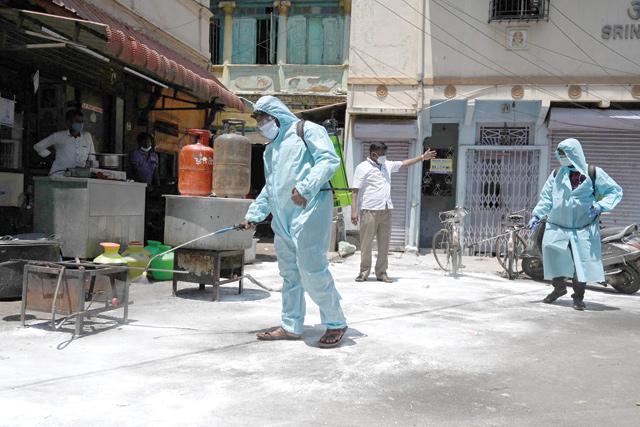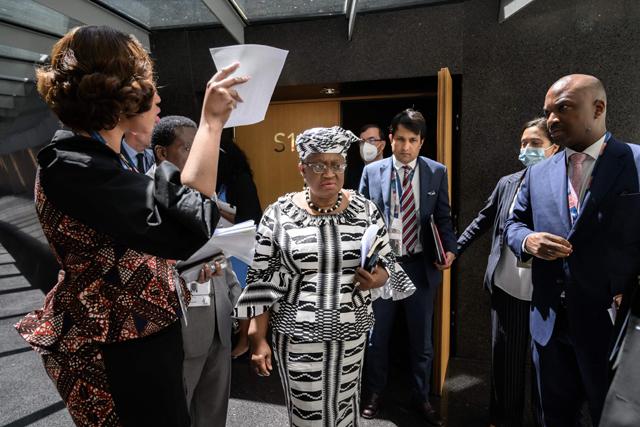You are here
India’s trade minister accuses US of ‘unacceptable’ protectionism
By Reuters - Mar 04,2014 - Last updated at Mar 04,2014
NEW DELHI — India’s trade minister on Tuesday accused the United States of excessive trade protectionism, launching a broadside that coincided with the visit of a top US official to patch up a stormy bilateral friendship.
Trade friction between the two countries has increased ahead of a general election in India, amid lingering tension over the recent arrest and strip search of a female diplomat in New York suspected of visa fraud.
The ruling Congress Party government of Prime Minister Manmohan Singh does not want to be seen as bowing to US pressure on trade issues ranging from the quality of Indian drug exports to software piracy.
“There are issues which India has raised where we feel there is very high and unacceptable protectionism,” Trade Minister Anand Sharma told reporters, noting that Washington made it too hard for Indian nationals to obtain US visas.
He said that India’s patent law was compliant with the rules of the World Trade Organisation (WTO), while India would not agree to tougher rules to protect intellectual property.
India is furious about a decision by the Office of the United States Trade Representative to drag it before the WTO over the subsidies and local content rules it has set to promote solar power generation.
Trade ministry officials say India’s rules on local sourcing were fully compatible with the WTO, and they argue that 16 US states have similar local sourcing provisions.
Indian analysts say the Obama administration appears to be seeking trade advantages from a weak government as part of its wider drive to export away the US trade deficit, which despite narrowing last year still totalled $470 billion.
“The US seems to be looking at exports to India, China and other emerging markets to support its economic growth,” said N.R. Bhanumurthy, an economist at the National Institute of Public Finance and Policy, a Delhi-based think-tank. “These frictions are likely to continue until a global recovery eases the pressure.”
The US embassy was not available for comment outside office hours.
Sharma’s prickly comments on US trade reflected concern about the sluggish pace of India’s own exports, which he forecast would grow by 4-5 per cent in the current fiscal year to the end of March.
India curbed imports of gold last year to narrow a worrying current account deficit, but with external pressures easing, Sharma suggested the curbs should be eased to discourage gold smuggling.
Only at WTO
India has made clear it would prefer to see bilateral disputes reviewed under the auspices of the WTO, the global trade rules body, which is adjudicating on more than a dozen cases between the two countries.
The government had instructed its officials not to entertain any request from the United States International Trade Commission (USITC) — a quasi-judicial federal agency — to examine its trade practices.
Referring to intellectual property, Sharma said India was adhering to the Agreement on Trade Related Aspects of Intellectual Property Rights (TRIPS), which is administered by the WTO.
India opposes any stricter agreements, known in the trade jargon as “TRIPS-plus”, that would assure greater patent protection for proprietary medications, potentially dealing a blow to its own generic drugmakers and making it harder for its citizens to get access to affordable medicines.
“India has protected its commitment to the TRIPS agreement. But what is being asked of India is TRIPS plus,” Sharma told reporters. “TRIPS plus, India has made it clear, India will never accept.”
Last month, global pharmaceutical firms pressured the United States to act against India to stop more local companies producing up to a dozen new varieties of cheap generic drugs still on-patent.
An Indian government committee is reviewing patented drugs of foreign firms to see if so-called compulsory licences, which in effect break exclusivity rights, can be issued for some of them to bring down costs, two senior government officials told Reuters.
The drugs that are part of the review process are used for treating cancer, diabetes, hepatitis and HIV, said the sources, declining to give details. No timeline has been given for completion of the review process.
Emerging markets, from South Africa to China and India, are battling to bring down healthcare costs and boost access to drugs to treat diseases such as cancer, HIV/AIDS and hepatitis.
Western drugmakers, including Pfizer Inc., Novartis AG, Roche Holding AG and Sanofi SA, covet a bigger share of the fast-growing drugs market in India.
But they have been frustrated by a series of decisions on patents and pricing, as part of New Delhi’s push to increase access to life-saving treatments where only 15 per cent of 1.2 billion people are covered by health insurance.
India is currently on the US government’s Priority Watch List — countries whose practices on protecting intellectual property Washington believes should be monitored closely.
The US industry trade group Pharmaceutical Research and Manufacturers of America (PhRMA) believes Washington should take a tougher line by downgrading it to a Priority Foreign Country, a classification for the worst offenders, which may trigger possible actions, sources said.
“The multinational companies are exploring all options — from paring their investments in the country to forcing the US to take some actions,” said a source in New Delhi, who is directly involved in the situation.
“Companies feel something should be done at the earliest to check the violations of their intellectual property in the country. They want government-to-government pressure to change things,” he added.
All the sources declined to be named due to sensitivity of the matter. A PhRMA representative declined to comment.
If India gets relegated by the United States to Priority Foreign Country level, it will join Ukraine as the second country in that segment. Countries in the Priority Watch List include China, Indonesia, Pakistan, Russia, Thailand and Argentina.
“PhRMA makes submissions to the US government every year on trade issues but this year they really want to ratchet up the pressure on India,” said one executive with a multinational drug company.
Politically sensitive
Making medicines cheaper is a politically sensitive issue in India where many patented drugs are too costly for most people, 40 per cent of whom earn less than $1.25 a day, and where patented drugs account for under 10 per cent of total drug sales.
Picking a fight with an emerging economy like India, where millions of people cannot afford basic healthcare, will not be easy and without risks.
The industry has recently run into fierce controversy in South Africa for taking on Pretoria over its plans to overhaul patent laws to favour cheaper generic drugs, leading some executives to urge a softer approach.
“I don’t believe there is any need for any kind of more assertive stance. This is a situation where constructive engagement is the way forward,” GlaxoSmithKline Plc. Chief Executive Andrew Witty told Reuters.
With sales of patented drugs in Western countries slowing, emerging markets are a vital growth driver for companies. India, however, has so far failed to be much of a money-spinner for the world’s top pharmaceutical companies.
India’s $14 billion-a-year drugs market — driven these days by chronic diseases, such as diabetes, as well as infections — is expected to be worth $22-32 billion by 2017, which would rank it as the 11th largest globally, according to IMS Health.
“Any obstruction or action by the US government can have a very adverse impact on the trade relations between the two countries,” said D.H. Pai Panandiker, president of New Delhi-based RPG Foundation, an economic think tank.
“So, both sides will be cautious, but to protect their own interests they won’t hesitate to take actions under the WTO [World Trade Organisation] provisions,” he added.
In 2012, India issued its first ever compulsory licence to domestic drugmaker Natco Pharma Ltd. on a kidney and liver cancer drug, Nexavar, patented by Germany’s Bayer AG, in a move that it had said endangered pharmaceutical research.
AstraZeneca Plc. in January decided to shut its research and development (R&D) centre in Bangalore citing broader global business strategy. Some analysts expect a few other global drugmakers to pare R&D spending given the uncertainty about the patent regime.
“If the authorities are going haywire and looking to grant compulsory licences lock, stock and barrel, in that event you will lose the credibility in India as a system,” Ameet Hariani, managing partner at Mumbai-based law firm Hariani & Co., said.
“You are going to see much more litigation on this issue. People are going to be unwilling to introduce new drugs in the market,” he added. “You can’t expect to get a new drug at a price of an aspirin.”
Related Articles
NEW DELHI — Five of the world's biggest emerging economies on Tuesday called for the development and delivery of COVID-19 vaccines to be spe
GENEVA — The World Trade Organisation(WTO) agreed on Friday to temporarily lift patents on COVID-19 vaccines after two years of bruising neg
GENEVA — The World Trade Organisation (WTO) chief voiced cautious optimism on Sunday as global trade ministers gather to tackle food securit


















